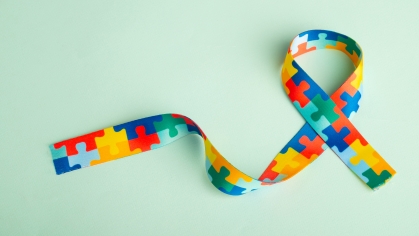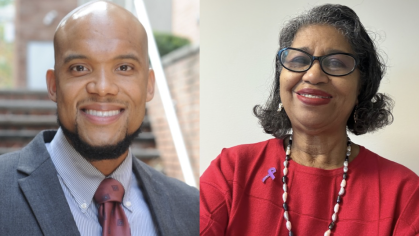Jewish American Heritage Month: A Student’s Reflections on Her Identity and its Connections to Social Work
By MSW student Hannah Loffman
In 2006, a presidential proclamation declared May as Jewish American Heritage Month, recognizing the contributions American Jews have made, and continue to make, to American history, culture, and society. Jewish American Heritage Month is significant because, as a religious and cultural minority in the US, the contributions of Jewish Americans have sometimes been omitted from the country’s national narrative due to a history of bias against Jewish communities. Jewish American Heritage Month is designed to authentically celebrate and honor Jewish Americans’ contributions and impact on American society.
There is a quote from Pirkei Avot (2:21), a Jewish book which translates to “Ethics of Our Ancestors” that reads, “you are not obligated to complete the work, but neither are you free to desist from it.” This teaching, which dates back thousands of years, has served as a grounding mantra for my identity as a Jewish American pursuing a career in social work. Doing “the work” is a concept rooted in the book of Deuteronomy in the Old Testament, where emphasis is placed on caring for others – the foundation of what we do in social work. For generations, Jews from around the world have brought these values to their families, communities, and society to meet people in whatever environments they lived. This Jewish American Heritage Month, I reflect on my family’s background and how it fueled my interest in social work.
My grandparents, who were first generation Americans, built their legacy on doing “the work.” My paternal grandmother, Sonia Noveck, worked as a translator, safeguarding her native Russian tongue while helping others find their voice in a new environment. My paternal grandfather, Morris Loffman, devoted his life to neurosurgery, ensuring quality of life for patients and driven by a moral compass. My maternal grandmother, Shirley Katz, served as an executive director of an assisted living facility, meeting others where they were in their life cycle to offer support and compassion. My maternal grandfather, Owen Katz, was an engineer and a veteran who committed his life to his personal code of ethics woven into every behavior in his life – leading with intentionality, thoughtfulness and deliberateness in practice. Though my grandparents have passed, when I share their names I am reminded of their legacies, and when I share their stories I am reminded of their humanity and how it impacted my career choice.
My grandparents created a lifestyle that connects me back to the mission of pursuing “the work,” which is deeply embedded in both Jewish teachings and social work. They represented, quite literally, the pluralism that exists within the Jewish community whether observant or non-observant, affiliated or unaffiliated, believer or non-believer. The plurality of Jewish American communities is a reminder that being Jewish is not a monolith and cannot be confined to a binary. As Jewish people, we come from many ethnicities, races, and cultures. We have dispersed into the global diaspora through thousands of years of persecution and continue to search for our resilience by connecting to the foundational constructs of Judaism, namely our sacred texts and cultivation of relationships. Some Jewish Americans connect to their heritage theologically, some spiritually, and some ritually, participating in daily, monthly, weekly, and yearly holidays. Though the Jewish people share a history and ancestral legacy, we are varied and diverse.
The manifestation of my family’s background, paralleled with the trajectory of my social work career, represents a heritage that shares a deep appreciation of engaging in “the work” that will leave the world better than it was found. I come from ancestors who enjoyed conversations with strangers, listening to people’s stories and showing up in the ways people asked of them. I see my intersections as a Jewish American as my life’s blueprint that tells the story of who I am, and I see the names and stories of those who set a precedent for my interactions and lived experiences – especially as a social work student.
My grandparents entered professions where they were required to interact with others. In turn, I cannot help but be acutely aware of the way people are interconnected and the power we have to hurt and heal one another. My grandparents cared deeply for others, Jews and non-Jews alike, and ingrained in me a desire to learn about the strengths that exist in our country: the impacts oppressive social structures have on the wellbeing of real people every day. My grandparents established the road of my family background, which has allowed me to obtain a plurality of viewpoints.
This Jewish American Heritage Month I share my grandparents' names and tell their stories to illustrate how I came to pursue a career in social work. To be quite honest, not a day passes where I am not reminded of the impact they had within their families, communities, and societies to which they belonged. The seeds they planted have allowed me to explore my Jewish identity, a part of myself of which I am extremely proud. I have been able to empathize, understand, and accept differences in all people – an important quality in respecting diversity and fostering inclusivity. These qualities encompass the multifaceted role of a social worker. As social workers, although it is not our duty to single handedly resolve society's problems, neither are we free to give up on solving them. As it says in Pirkei Avot (2:21) “you are not obligated to complete the work, but neither are you free to desist from it.”
This story was created in partnership with Rutgers School of Social Work's Inclusion, Intersectionality, Diversity, Equity, and Advancement (IIDEA) Committee in support of our commitment to diversity, equity, and inclusion.



